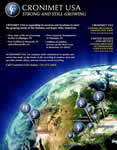|
THE
PULSE
Newsletter of the Canadian Association of Recycling Industries
Volume 17, No. 5, May 2012
President’s Message | Member Activity | Fast Facts
PRESIDENT’S MESSAGE
 Over the past decade we’ve seen issues that were once isolated to our industry becoming mainstream topics and concerns. Misinformation and lack of information have created some negative conceptions about the recycling industry. Over the past decade we’ve seen issues that were once isolated to our industry becoming mainstream topics and concerns. Misinformation and lack of information have created some negative conceptions about the recycling industry.
Those of us who attended the general session at last month’s ISRI convention watched an unusual public forum where politically and socially active community members gave their candid opinions about our industry. It will come as no surprise that our industry is misunderstood. What might come as a surprise is learning that these people’s misconceptions were not swayed by facts.
Evidence is only persuasive if you trust the source. The forum at ISRI demonstrated that for the public to understand our industry, they must first trust us. We need to form a personal connection with the public for them to see the good we do. As Marshall McLuhan once said, “I wouldn’t have seen it if I hadn’t believed it.”
CARI and ISRI devote time and staff to communicating our industry’s messages to governments, media, and the public. These associations can provide the facts and statistics and the broad industry viewpoint, but not necessarily a personal perspective. We as individual recyclers can connect personally to the members of our communities.
Not all of us are comfortable talking to the media (and members can always direct requests for interviews or information to CARI), but communicating with local media and with members of your community about a topical issue like metal theft can help establish the trust necessary to getting our message across. This trust can benefit your business specifically and our industry overall.
 A poor interview or comment can be damaging, so we encourage our members to establish communication protocols and to appoint one individual as their media contact. When approached about an interview, find out as much as possible beforehand: ask what the story is about, find out the deadline, and research the interviewer. If you know the story’s angle, you can often anticipate the type of questions you will be asked. Prepare a list of key points to which you can refer and try to steer the interview back to these themes. Wherever possible, use illustrative examples and paint a personal picture; you can always provide the interviewer with fact sheets and resources for follow-up material. Keep your message consistent, be brief, be accurate, and stay positive. If you don’t know an answer, say so, and don’t feel that you have to fill a silence. And always assume everything you say is on the record. A poor interview or comment can be damaging, so we encourage our members to establish communication protocols and to appoint one individual as their media contact. When approached about an interview, find out as much as possible beforehand: ask what the story is about, find out the deadline, and research the interviewer. If you know the story’s angle, you can often anticipate the type of questions you will be asked. Prepare a list of key points to which you can refer and try to steer the interview back to these themes. Wherever possible, use illustrative examples and paint a personal picture; you can always provide the interviewer with fact sheets and resources for follow-up material. Keep your message consistent, be brief, be accurate, and stay positive. If you don’t know an answer, say so, and don’t feel that you have to fill a silence. And always assume everything you say is on the record.
Public support can do us a lot of good. Our industry’s reputationincluding the way we are represented by mainstream media and public chatter on social mediais crucial to our growth and prosperity, just as we are crucial to the growth and prosperity of our economy and our environment.
Bertrand Van Dorpe
CARI President
MEMBER ACTIVITY
NEWALTA Corporation recently endowed Western University with a $1.125 million donation. The company will provide $1 million over the next five years to fund the research and development of new technologies that will help protect the environment and create value from perceived wastes. The fund’s first project focuses on finding cost-effective solutions for recycling and recovering products from industrial waste residues in oil sands. An additional $125,000 goes to the NEWALTA Corporation Ontario Graduate Scholarships for Master’s or Doctoral graduate students in the Faculty of Engineering. The scholarship is open to students whose research concentrates on environmental engineering in the areas of waste treatment, recovery or recycling.
FAST FACTS
British Columbia’s Metal Dealers and Recycler’s Act is now official, and the regulations will come into effect July 23, 2012. Dealers of regulated material must now register with the province, and will be required to collect and record a seller’s identification (name, address, phone number, date of birth and vehicle description) and to send daily notices of their metal purchases to police. No cash payments over $50 will be permitted. Provincial inspectors will begin checking scrapyards and non-compliant dealers face fines of up to $10,000 for an individual or $100,000 for a company.
ISRI presented the Quebec-based company Cascades Fine Papers Group with their annual Design for Recycling® Award at their convention last month. Cascades was given the award based on their development of a 100% Recycled and Recyclable Ream Wrapper for its fine paper that eliminates plastic contaminants, reduces waste, and turns waste into a recyclable commodity. Candidates for the Design for Recycling® Award must demonstrate that their products can be recycled safely and economically, using existing recycling technologies and methods.
Toyota Tsusho America Inc. is developing a collection system in anticipation of the first wave of hybrid vehicle batteries entering the recycling stream. The company has operated a system in Japan for the past 10 years and is now looking to partner with North American recyclers. Toyota Tsusho estimates more than 50,000 batteries will begin arriving at scrapyards within the next four years. Improperly handled batteries pose a safety hazard, because the batteries were not designed to be disassembled by anyone other than engineers. Even dead hybrid batteries may contain 200 volts.
Honda Motor Company and Japan Metals & Chemicals are using a new mass-production process to extract rare earth metals from used nickel-metal hydride batteries. Honda had been applying a heat treatment to the batteries and recycling nickel-containing scrap. They expect the new extraction process to produce very high purity rates for recovered material, and to remove as much as 80% of the rare earth metals. The extracted materials will be used in the batteries of other Honda products.
Last month the BIR sent a letter to the European Commission and the Italian Minister of the Environment opposing Italy’s amended waste-shipping regulations. These regulations decree each international shipment of waste must be accompanied by a certificate, issued by the authorities in the destination country, confirming that environmental standards apply which are comparable to those in the European Union. BIR says the amended legislation goes against EU regulations and could have disastrous effects on Italian operators, and reduce global supplies.
At its April conference, ISRI named several new board members who will serve two-year terms. Doug Kramer, President of Kramer Metals Inc. was named Chair-elect; Mark Lewon, Vice-president of Operations at Utah Metal Works was named Vice-chair; and Brian Shin, President of Manitoba Corp. was named Secretary-Treasurer. Jerry Simms, Executive Vice-president of Atlas Metal & Iron replaces John Sacco as ISRI’s new Chairman of the Board.
|